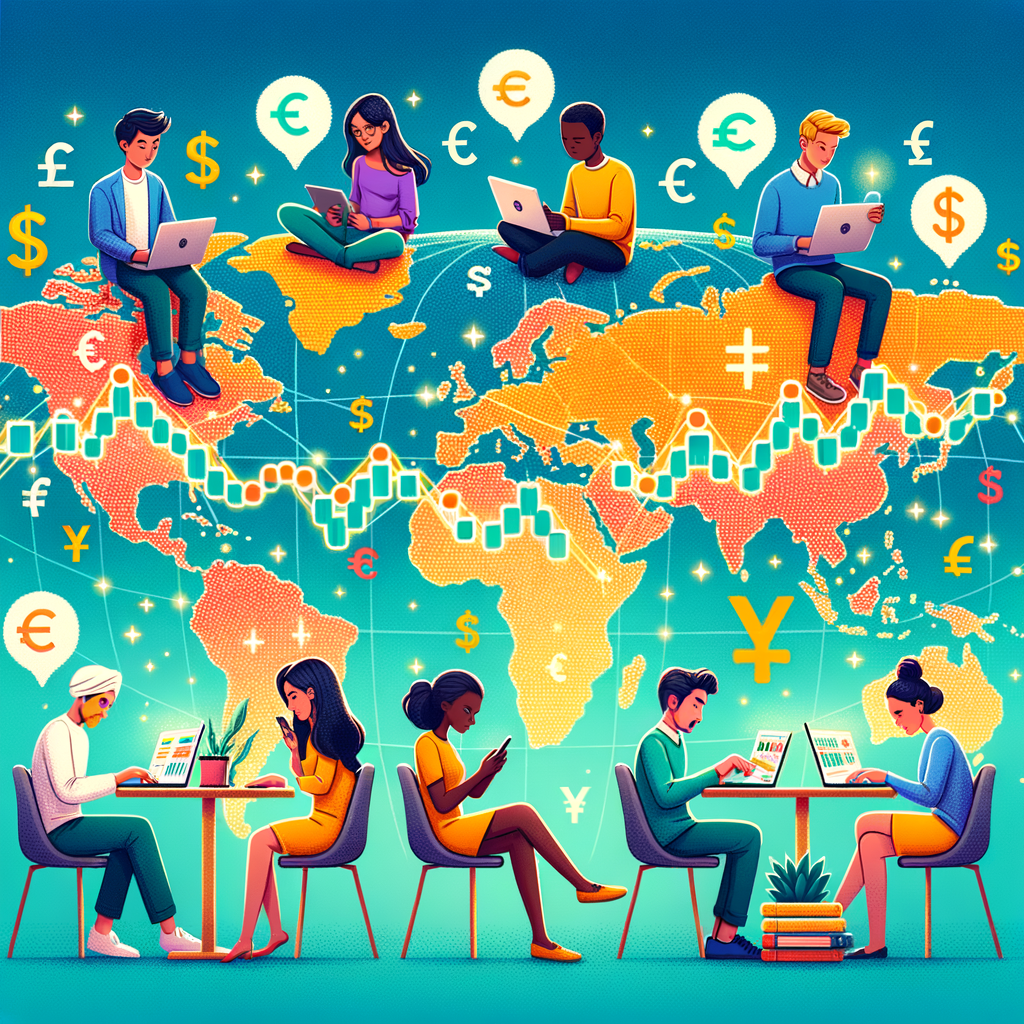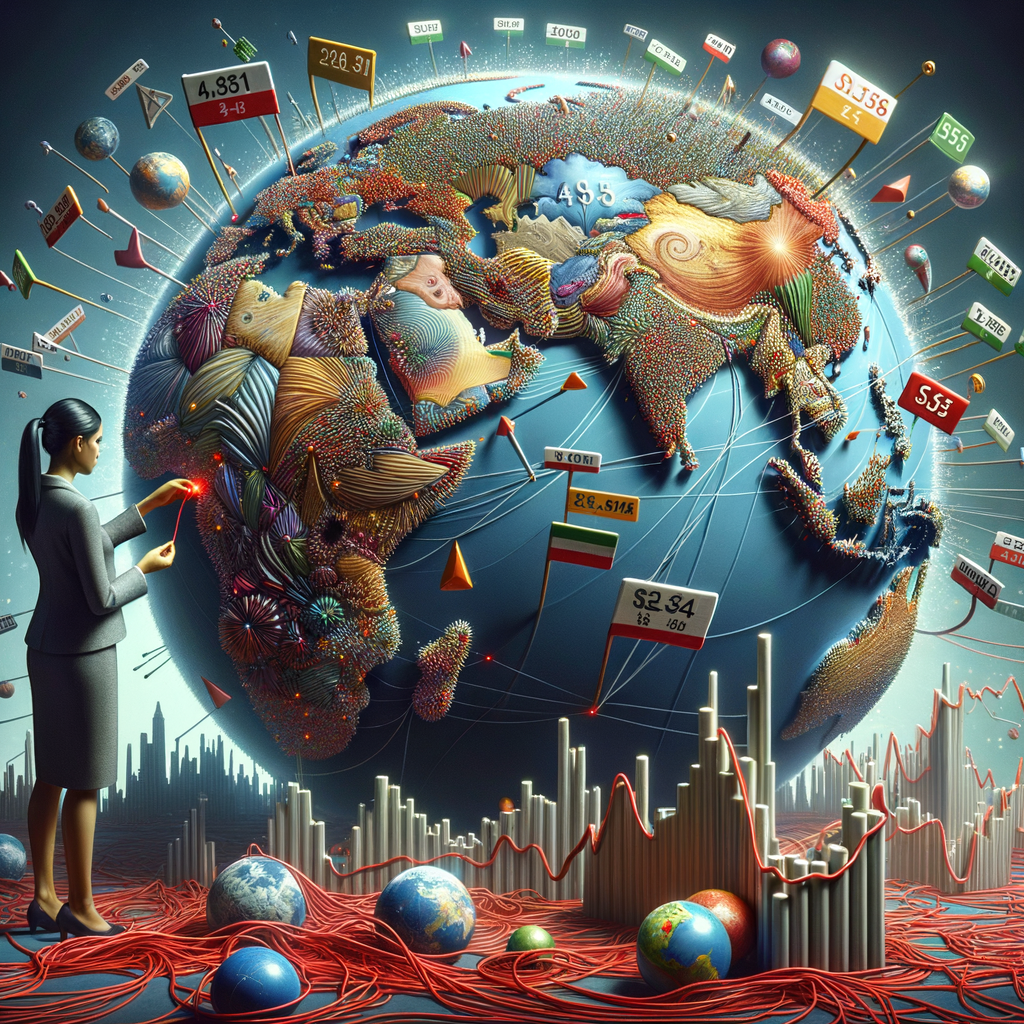Once considered the exclusive domain of institutional investors and major banks, the foreign exchange (Forex) market is now surging in popularity among individual traders around the world. With daily trading volumes exceeding $7 trillion, according to the Bank for International Settlements, Forex is not just growing—it’s evolving. But where exactly is interest in Forex accelerating the most, and what’s driving new participants into this high-risk, high-reward marketplace?
Asia: The Epicenter of Emerging Forex Activity
Asia has emerged as one of the hottest regions for Forex trading. According to Dr. Miguel Navarro, a market economist and former advisor to the Hong Kong Monetary Authority, this trend is driven by “a combination of increasing financial literacy, smartphone adoption, and limited access to traditional capital markets in some countries.”
- India: Once heavily restricted, Forex trading in India is undergoing a transformation. With tighter regulation, a growing middle class, and a tech-savvy youth population, Indian traders are increasingly seeking exposure to global currencies.
- Philippines: Remittances and the growth of digital finance have contributed to a rising interest in Forex among overseas workers and younger investors.
- Vietnam and Thailand: These markets have seen an uptick in trading platforms and broker activity, particularly in urban centers where online investing is booming.
Africa: A Growing Continent of Traders
Despite infrastructure challenges, Africa is seeing an undeniable surge in Forex interest. In Nigeria, Kenya, and South Africa, local influencers, Telegram trading communities, and decentralized apps are democratizing access to currency markets.
“Nigeria is an especially interesting case,” says Janet Ogunde, an economist focused on fintech in sub-Saharan Africa. “The lack of formal investment channels makes Forex an attractive and accessible alternative—despite the risks.”
Latin America: Forex as a Hedge Against Inflation
In countries like Argentina and Venezuela, chronic inflation has led citizens to seek refuge in USD and other stable foreign currencies. Forex platforms that offer dollar-paired trading are exploding in popularity as locals look to preserve their wealth or engage in speculative trading.
Eastern Europe and the Balkans
Poland, Romania, and Serbia have long-standing trading communities, but recent economic shifts and access to European Union markets have further fueled Forex activity. Platforms are now advertising directly to university students and freelancers.
Iran: A Unique but Determined Participant
While Iran may not appear in official rankings of Forex trading growth, anecdotal and digital evidence shows a very active and engaged trading community. Despite regulatory constraints and economic sanctions, Iranian traders are not only studying Forex—they are trading with remarkable agility.
“Iranians are resourceful,” says a Tehran-based financial analyst who asked to remain anonymous. “They use VPNs, decentralized brokers, and Telegram channels to access Forex markets. It’s not just speculation—it’s a financial necessity for many households.”
The demand for educational content in Farsi has also skyrocketed, and Iranian YouTubers and bloggers are emerging as influential figures in the local Forex scene.
Western Markets: A Mature but Evolving Space
While countries like the United States, the UK, and Germany have had long-standing Forex communities, their interest has shifted more toward automation, algorithmic trading, and institutional strategies. However, the growth of social trading platforms (like eToro) continues to attract retail interest.
Key Drivers Behind Global Forex Growth
| Factor | Impact |
|---|---|
| Smartphone penetration | More people have access to trading apps |
| Inflation and economic instability | Citizens hedge wealth using foreign currencies |
| Social media and influencers | Forex education is more accessible and viral |
| Crypto adoption | Bridges users into broader financial speculation |
| Job uncertainty post-COVID | More individuals seek alternative income streams |
FAQ: 30 Questions About Forex Growth and Trading Trends
- What is Forex trading?
Forex (foreign exchange) trading is the act of buying and selling currencies to profit from exchange rate fluctuations. - Why is Forex trading becoming more popular?
Accessibility through mobile apps, economic instability, and increased financial literacy are key drivers. - Which countries are seeing the fastest Forex growth?
India, Nigeria, Vietnam, Iran, and Argentina are among the leaders in growth. - Is Forex trading legal everywhere?
No. Some countries regulate or restrict Forex trading, while others ban it entirely or operate in grey zones. - Is Forex trading popular in Iran?
Yes. Despite restrictions, Iranians actively study and participate in Forex markets using decentralized tools. - What is the daily volume of Forex trading globally?
Over $7 trillion as of 2023, according to BIS data. - Why is Africa becoming a hot spot for Forex?
Increased smartphone access, lack of investment alternatives, and youth-led tech adoption are contributing factors. - Do people in Latin America trade Forex for income?
Many use Forex as a hedge against inflation or as speculative income in economies with currency instability. - What role do influencers play in Forex growth?
They help spread education and platform awareness, particularly via YouTube, Telegram, and TikTok. - Is Forex safe for beginners?
It can be risky. Beginners should start with demo accounts and solid education before using real money. - What tools do Forex traders use?
Charts, technical indicators, economic calendars, and risk management platforms are commonly used. - Is Forex trading regulated?
Yes, but levels of regulation vary by country. Always check broker licenses. - What is leverage in Forex?
Leverage allows traders to control a large position with a small amount of capital, increasing both risk and reward. - Do mobile apps support Forex trading?
Yes. Most brokers offer full-featured trading apps for iOS and Android. - What is social trading?
It lets users follow or copy trades of more experienced investors through platforms like eToro or ZuluTrade. - Are there religious concerns with Forex in Muslim countries?
Yes. Shariah-compliant (swap-free) accounts are often offered by brokers to address this. - How do sanctions affect Forex in countries like Iran?
They limit access to international banking, so traders rely on VPNs, crypto, and P2P solutions. - What currencies are most traded?
USD, EUR, JPY, GBP, and AUD are among the top traded currencies. - Can Forex help hedge against inflation?
Yes. It allows traders to protect value by holding stronger currencies. - Is Forex trading taxed?
Yes. Tax obligations vary by jurisdiction and must be researched locally. - Can students learn Forex trading?
Yes, and many do. However, financial risk awareness is crucial. - What’s the difference between Forex and crypto trading?
Forex involves fiat currencies and regulated markets, while crypto trading involves digital assets with more volatility and fewer regulations. - Are women participating in Forex more now?
Yes. Global data shows rising female engagement, especially in education-focused communities. - Do governments discourage Forex trading?
Some do due to financial risks, capital controls, or fear of currency manipulation. - What are pip and lot in Forex?
A pip is the smallest price move a currency can make. A lot is the standardized trading unit (usually 100,000 units). - How do traders manage risk?
Using stop-loss orders, position sizing, and diversified strategies. - What is a Forex broker?
A firm that facilitates currency trading by providing a trading platform and liquidity access. - Do all countries allow retail Forex brokers?
No. Some restrict or ban them entirely, pushing traders to offshore or unlicensed alternatives. - What should I look for in a broker?
Licensing, low spreads, platform quality, payment methods, and customer support. - Is Forex trading a good career?
It can be profitable, but it requires discipline, education, and risk tolerance. It’s not a guaranteed income stream.
Conclusion
From Southeast Asia to sub-Saharan Africa—and yes, even in places like Iran—Forex is no longer a niche market. It’s a growing global phenomenon driven by technology, macroeconomics, and human adaptability. While the risks of leverage and market volatility remain, the spread of information and tools makes Forex more accessible than ever. As always, education and regulation will determine whether this wave empowers a new generation of traders or leads to a new wave of financial pitfalls.





Wow! This article really opened my eyes to the world of Forex. I had no idea it was so popular in countries like India and Nigeria! I’m excited to learn more and maybe even try trading myself. Thanks for sharing this info!
I learned that Forex trading can be risky for beginners. It’s good to start with demo accounts!
‘Forex education is important!’ I agree! People need to know what they’re doing before jumping in.
‘Decentralized apps’? I can’t even centralize my socks! How am I supposed to trade currencies? 🤷♂️
So you’re telling me I can risk my money in Forex instead of just losing it at the casino? Sign me up! 😆
The article explains well how social media influences Forex growth. It’s amazing how connected we all are!
So, let me get this straight: I can now trade currencies from my couch? Amazing! What’s next, trading stocks with my cat?
I never thought about Forex before, but now I’m really curious to learn more.
‘Financial necessity’ is a strong reason for many traders. This makes me think about the challenges they face.
‘High-reward’? More like high-risk! Most will end up regretting it.
‘Financial literacy’ doesn’t mean people will be good at trading. This could end badly for many!
Forex sounds like a great opportunity for many people. Exciting times ahead!
‘High-risk, high-reward’—sounds like my last blind date. Where do I sign up for this Forex romance?
‘High-risk, high-reward’? Sounds like my last relationship!
This article is just a hype piece. Forex is too risky for most people!
‘Social trading platforms’… So now we can lose money together as friends? Count me in!
‘Decentralized brokers’ sounds complicated but helpful for those in restrictive countries.
‘Wow, didn’t know about the growth in Africa! So inspiring to see new markets open up.’
This trend is going to crash hard. Just wait and see!
This article opened my eyes! 📈 I feel inspired to learn more about Forex and maybe try it myself!
Wow! I never knew Forex was so big! 🌍 It’s amazing to see how technology is helping everyone trade!
They make it sound so easy, but we all know that’s not true. Very misleading.
Who cares about Forex? It’s just another way to lose money.
‘This article makes me want to try Forex trading! Can’t wait to learn more.’
‘Education will empower traders’—so true! 🎓 This article gives hope for many aspiring traders out there!
I think it’s amazing how Forex is growing in different countries. Great read!
I don’t get why anyone would jump into this without serious knowledge. Not for me.
‘Tech-savvy youth’ might just lose their savings in Forex. It’s not a playground!
‘Daily trading volume exceeds $7 trillion.’ That number is mind-blowing! Forex is huge now!
I love how Forex is reaching so many people now! 💖 It’s like a new adventure waiting for us all!
The stories from different countries are so touching. 🌙 It’s beautiful how people adapt and thrive in Forex!
‘Democratizing access’? Sounds like a great way to make financial mistakes on a global scale!
‘Educational content in Farsi’? Great! Just what I needed: more ways to confuse myself while losing money!
‘Financial necessity’? That’s just an excuse for getting into trouble.
Wow, who knew Forex was the new hot trend? Next, they’ll be saying knitting is the next big investment strategy!
‘Smartphone adoption’ isn’t going to save you from bad trades. This article is misleading.
Forex is evolving? Thanks for the breaking news! I was still stuck in the Stone Age of investing.
It’s interesting to see how smartphones are helping more people trade Forex. Technology really changes everything!
I thought Forex was a new brand of cereal! Turns out it’s just people playing with money. Who knew?!
This article makes Forex sound way too easy! You can’t just dive in without knowing the risks!
Wow! I had no idea Forex was so big. Thanks for sharing this info!
‘Hedge against inflation’? I’m just trying to hedge against my cat stealing my dinner! 🐱
Wow, I didn’t know that people in Iran are so active in Forex trading despite restrictions.
This article is super interesting! I love learning about new ways to trade.
Forex trading? Sounds like a fancy way to lose money while trying to find the best currency for my pizza delivery!
‘I’m excited about the future of Forex! Thank you for highlighting these trends!’
Wow, who knew trading could be so glamorous? Next, they’ll tell us Forex is the new fashion trend!
‘Democratizing access’? That’s just fancy talk for ‘let’s let everyone risk their money.’
“Smartphone penetration”—that sounds more like a tech conference than a finance article!
Inflation is a big problem in places like Argentina, and it’s smart for people to use Forex as a hedge.
“Hedge against inflation”—I thought we were talking about investing, not gardening tips!
‘Smartphone penetration’ sounds like a bad Tinder date gone wrong, but here we are talking about Forex!
So basically, if I download an app, I’m a Forex expert now? Great! Where do I sign up for my Nobel Prize?
‘High-risk, high-reward’—that sounds thrilling! ⭐ I feel like I’m on the edge of my seat reading this!
So cool to see how technology is changing trading! Thanks for the insights!
‘Democratizing access’? That’s one way to say it! Just wait until everyone thinks they’re a stockbroker.
Is it just me, or does Forex sound like a fancy way to lose money faster?
“Social media and influencers” really make a difference, huh? 📱 It’s exciting to think about the future of trading!
‘Economic instability’? That’s just how my bank account feels after payday! 😂 Forex seems risky!
‘Emerging market’ sounds good, but it’s still a gamble with your money.
‘Financial literacy’? The only thing I’m financially literate in is how to buy snacks on sale! 🍕
Oh boy, more people trading currency instead of actual jobs. What could possibly go wrong?
‘Accessibility’? More like an invitation to lose everything you have!
‘Hedge against inflation’? Can someone hedge my bank account too while they’re at it?
Such an informative piece! 🌿 I can’t believe the growth in places like Africa and India. Inspiring!
‘Educational content’ doesn’t mean people will make smart decisions. Be careful out there!
‘Smartphone adoption’ is the key driver? So my phone’s going to trade for me now? Awesome!
‘Education and regulation’? I see more scams than anything else in this space.
‘High-risk, high-reward’? Sounds like my last relationship! 😂 Forex must be exciting!
I don’t get why everyone is so excited about Forex. It seems like a gamble to me!
Forex trading is really growing fast! I had no idea it was so popular in places like India and Nigeria.
$7 trillion daily? Well, I guess Monopoly money just got a major upgrade!
Forex sounds great in theory, but it’s risky! Not everyone should try it out.
‘Forex’ sounds fun! I want to explore trading now. Thank you for the info!
Forex is growing? That’s news! What’s next? Croquet becoming an Olympic sport?
Forex seems like a magical world of opportunities! ✨ I’m excited to explore this new horizon!
‘Financial literacy’? More like financial lottery for some lucky folks out there!
The idea that everyone can just trade currencies is unrealistic! What about the people who lose money?
‘Hedge against inflation’? More like a way to lose everything when the market crashes!
Trading currencies? I can barely trade my lunch without messing it up! 😂
‘Resourceful Iranians’ – what a fantastic line! 🦒 This makes me want to learn more about their journey in trading.